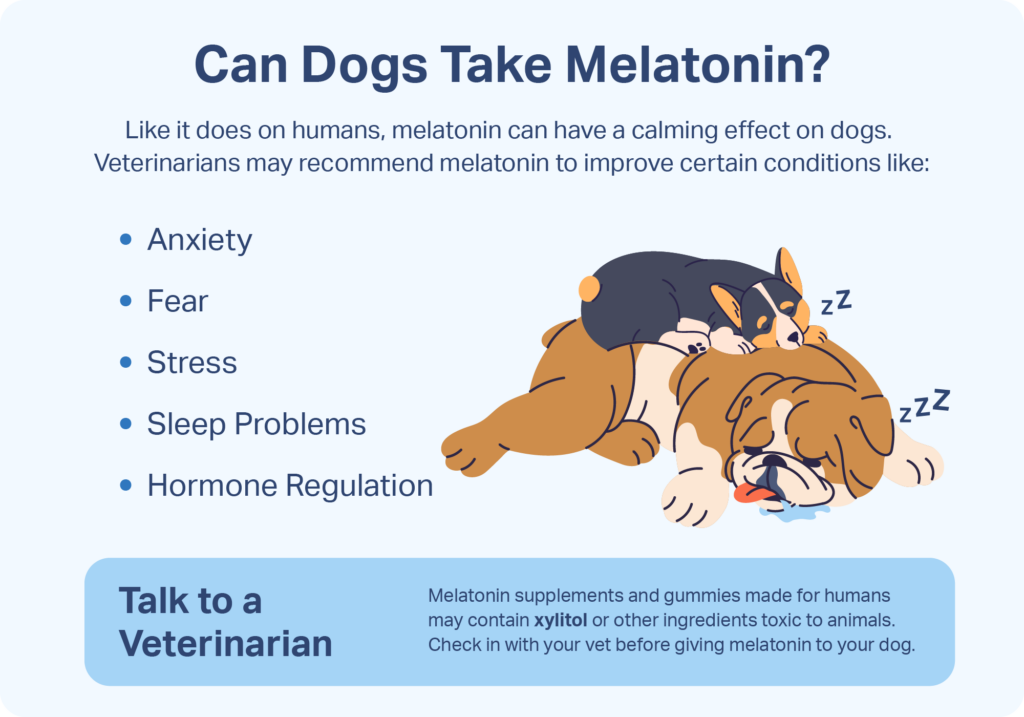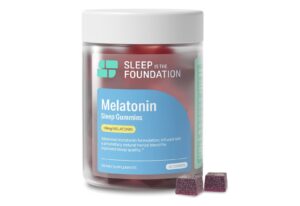When you buy through our links, we may earn a commission. Products or services may be offered by an affiliated entity. Learn more.
Melatonin for Dogs: Dosage, Benefits, and Safety
- Melatonin can help improve anxiety, fear, stress, sleep issues, and hormone problems in dogs.
- The dose of melatonin is determined by a dog’s weight, or 0.1 milligrams of melatonin for each kilogram of the dog’s weight.
- Always consult with a veterinarian before giving a dog melatonin.
- Do not give melatonin supplements designed for humans to dogs as ingredients like xylitol can be toxic.
Melatonin is known for its role in helping people sleep, but this hormone also affects animals. Although research is limited, melatonin supplements are generally believed to be safe for dogs, and veterinarians may suggest melatonin supplements to help dogs with sleep problems, behavioral issues, and medical conditions.
For pet owners, it can be helpful to learn more about melatonin for dogs, including when to use it and how much to give. Pet owners should also know about the importance of working with a veterinarian and choosing a quality supplement.
Can Dogs Take Melatonin?
Melatonin supplements are believed to be safe for most dogs when used in appropriate amounts, and many veterinarians prescribe melatonin to try to help dogs with various health issues.
Melatonin is a hormone that all mammals produce naturally. Animals produce melatonin during periods of darkness, and their melatonin levels can change throughout the year in response to varying amounts of daylight. Melatonin has many potential functions, including helping animals sense the time of day and regulate seasonal changes in their body and behavior.
The body can make melatonin naturally, but veterinarians may recommend melatonin supplements for some behavioral or medical conditions in dogs.

Although there is a lack of research about melatonin’s effectiveness in dogs, it is common in veterinary medicine to consider prescribing medications that have been studied and used in humans. In people, melatonin may be used for sleeping problems like delayed sleep-wake phase disorder, and jet lag.
Before giving a dog any new supplement or medication, it is important to speak with a veterinarian. Prior to recommending melatonin, a veterinarian may perform an exam and conduct tests to diagnose the cause of behavior or sleep issues. This may help identify the optimal treatment and ensure that melatonin is a safe and appropriate option.
How Melatonin Can Affect Your Dog
Veterinarians may recommend melatonin to treat dogs experiencing stress and anxiety, sleeping problems, or certain medical conditions. Melatonin may be suggested in addition to other treatments for these issues because of its potential effects on sleep and behavior.
Melatonin for Stress, Anxiety, and Phobias in Dogs
Melatonin may be helpful for dogs who regularly experience anxiety, stress, phobias, or signs of cognitive dysfunction .
Many dogs experience anxiety that may be triggered by fear of a potential threat, separation from their family, or changes in their environment or routine. Anxiety and sleep problems can also be a sign of cognitive problems in older dogs.
Anxiety sometimes occurs as a phobia, which describes a sudden and intense response to a trigger, such as loud noises from a vacuum cleaner, fireworks, or thunder. Because dogs cannot say when they are anxious or afraid, they may display their anxiety through a wide range of behaviors, including:
- Chewing, scratching, or other destructive behavior
- Shaking or shivering
- Barking, howling, or crying
- Going to the bathroom in the house
- Excessive salivating
- Pacing or having difficulty settling down
- Refusing to eat
These and other behavioral challenges in dogs are usually treated with a combination of training, changes to the dog’s environment, and medication or supplements.
Melatonin for Sleep Issues in Dogs
Like their human counterparts, dogs need sleep for their health and well-being. Changes in a dog’s sleep patterns may be a sign of an underlying medical issue, a symptom of a sleep disorder, or a response to changes in their surroundings. While more research is necessary, some experts believe that melatonin supplements may help to alleviate insomnia and other disruptions in a dog’s sleep-wake cycle.
Melatonin may also be used in dogs that cannot tell when it is light or dark outside because of blindness or other problems with their vision. In humans, this condition is called non-24-hour sleep-wake rhythm disorder and is often treated with supplemental melatonin .
Other Uses of Melatonin in Dogs
Other potential uses of melatonin in dogs include the following:
- Hair loss: Research suggests that melatonin may be helpful for dogs with hair loss. In dogs with certain types of alopecia, melatonin may help prevent hair loss, promote regrowth of fur, and encourage the formation of a healthier coat.
- Cushing’s disease: Melatonin may be an alternative treatment for Cushing’s disease, a condition caused by excess production of the hormone cortisol. Examples of symptoms of Cushing’s disease in dogs include increased hunger and thirst, hair loss, and panting more than usual.
- Thrombocytopenia: Canine immune-mediated thrombocytopenia (ITP) is a common disorder in dogs in which the immune system attacks platelets or cells in the bone marrow. Some veterinarians prescribe melatonin alongside other treatments for canine ITP.
Researchers continue to explore other potential uses of melatonin in dogs. For example, studies are evaluating whether melatonin may reduce the anesthesia required before surgery, improve the outcomes of cataract surgery , or be beneficial as a treatment for canine cancer.
Melatonin Dosage Chart for Dogs
The right dose of melatonin depends on several factors, including a dog’s weight and medical needs . For these reasons, it is important to talk to a veterinarian for support in finding the right dose of melatonin for any specific dog.
When giving melatonin for anxiety or as a sleep aid, the dose of melatonin is determined by a dog’s weight. Some experts suggest giving a dog melatonin every 8 hours at a dose of 0.1 milligrams of melatonin for each kilogram of the dog’s weight.
| Dog Size | Weight | Melatonin Dosage |
|---|---|---|
| Extra Small | Less than 5 kilograms | 0.5 milligrams every 8 hours |
| Small | 5 to 15 kilograms | 0.5 – 1.5 milligrams every 8 hours |
| Medium | 15 to 50 kilograms | 1.5 – 3 milligrams every 8 hours |
| Large | 30 to 50 kilograms | 3 – 5 milligrams every 8 hours |
| Extra Large | Over 50 kilograms | 5 milligrams every 8 hours |
When To Give Your Dog Melatonin
To address a dog’s anxiety or phobias, it may help to give a dose of melatonin prior to the trigger that can cause distress. A veterinarian may recommend providing a dose of melatonin between 30 minutes and 2 hours before the anticipated anxiety-provoking event in order to allow enough time for the supplement to take effect.
For helping a dog sleep, avoid giving melatonin during the day. Instead, wait until around 30 minutes before the desired sleep time. To help establish healthy sleep patterns, it is recommended to give melatonin as part of a bedtime routine. Components of evening routines for dogs can include keeping a consistent bedtime, turning off bright lights, limiting noise, and providing the same comfortable place to sleep each night.
Risk of Melatonin Side Effects in Dogs
When given in proper amounts, melatonin is considered safe to give to dogs. Although harmful effects are uncommon, giving too much melatonin may cause a dog to be lethargic and have an upset stomach. Other potential side effects include:
- Fertility issues
- Increased heart rate
- Cramping
- Itchiness
- Confusion
Melatonin may also interact with other medications given to dogs. Melatonin can increase the effects of benzodiazepines, which are used to treat anxiety and seizures. It may also interact with succinylcholine, a drug that is sometimes used as a muscle relaxer in animals.
For these reasons, it is important to talk to a veterinarian before giving melatonin to dogs, especially dogs that are taking other medications as well as dogs that are pregnant, very young, or have other medical conditions.
Are Melatonin Gummies Safe for Dogs?
While melatonin is safe for most dogs when using an appropriate dose, some supplements can include other ingredients that may pose health risks. Melatonin gummies designed for humans often contain xylitol and other ingredients considered toxic to dogs.
Additionally, some gummies may not contain the right amount of melatonin for dogs. In fact, research has found that melatonin supplements vary in quality, and some may contain a different amount of melatonin than what is listed on the package. For this reason, it is best to talk to a veterinarian about finding a high-quality melatonin supplement.
Choosing a Melatonin Supplements for Your Dog
With such a wide range of melatonin supplements on the market, it can be challenging to find the right one for your dog. Melatonin comes in a variety of formulations for dogs, including pills, drops, powders, lotions, and liquids. Several considerations may be helpful when choosing a melatonin supplement.
- Advice from a vet: Contact your veterinarian before giving your dog a melatonin supplement, especially if your dog is taking other medications, is pregnant or will become pregnant, or has a diagnosed medical condition. A veterinarian can help you select the right supplement and find the appropriate dose.
- Find quality supplements: Because melatonin supplements are not regulated by the FDA, be cautious about trusting what is written on the label. When possible, find a reputable supplement by asking a vet or looking for third-party verification of the product.
- Check the ingredient list: Not all human supplements are safe for dogs. Before giving a supplement to your dog, check the label for toxic ingredients like xylitol. Also check the label to make sure that the melatonin has not expired.
- Watch for side effects: Although generally safe for dogs, look out for side effects after giving melatonin. If you notice any abnormal or concerning symptoms, contact a veterinarian as soon as possible.

Still have questions? Ask our community!
Join our Sleep Care Community — a trusted hub of sleep health professionals, product specialists, and people just like you. Whether you need expert sleep advice for your insomnia or you’re searching for the perfect mattress, we’ve got you covered. Get personalized guidance from the experts who know sleep best.
References
8 Sources
-
Peace, A. C., Kumar, S., Wills, R., Mackin, A., Hoh, C. M., & Archer, T. (2019). Pharmacodynamic evaluation of the effects of oral melatonin on expression of the T-cell cytokines interleukin-2 and interferon gamma in the dog. Journal of Veterinary Pharmacology and Therapeutics, 42(3), 278–284.
https://pubmed.ncbi.nlm.nih.gov/30680749/ -
Landsberg, G. M. (2014, May). Principles of pharmacologic and natural treatment for behavioral problems. Merck Manual Veterinary Manual: Professional Version., Retrieved October 16, 2022, from
https://www.merckvetmanual.com/behavior/behavioral-medicine-introduction/principles-of-pharmacologic-and-natural-treatment-for-behavioral-problems -
American Society for the Prevention of Cruelty to Animals. (2019, January 29). Rest easy: Getting the facts on pet safety and sleep aids., Retrieved on October 16, 2022, from
https://www.aspca.org/news/rest-easy-getting-facts-pet-safety-and-sleep-aids -
Mondino, A., Delucchi, L., Moeser, A., Cerdá-González, S., & Vanini, G. (2021). Sleep disorders in dogs: A pathophysiological and clinical review. Topics in Companion Animal Medicine, 43, 100516.
https://pubmed.ncbi.nlm.nih.gov/33556640/ -
Abbott, S. M. (2022, April 13). Non-24-hour sleep-wake rhythm disorder. In Goldstein, C. A. (Ed.). UpToDate., Retrieved October 16, 2022, from
https://www.uptodate.com/contents/non-24-hour-sleep-wake-rhythm-disorder -
Cotter, S. M. (2019, May). Platelet disorders in animals. Merck Manual Veterinary Manual: Professional Version., Retrieved October 16, 2022, from
https://www.merckvetmanual.com/circulatory-system/hemostatic-disorders/platelet-disorders-in-animals -
Sande, P. H., Álvarez, J., Calcagno, J., & Rosenstein, R. E. (2016). Preliminary findings on the effect of melatonin on the clinical outcome of cataract surgery in dogs. Veterinary Ophthalmology, 19(3), 184–194.
https://pubmed.ncbi.nlm.nih.gov/25959258/ -
Shipstone, M. (2022, April). Hormonal treatment for integumentary disease in animals. Merck Manual Veterinary Manual: Professional Version., Retrieved October 16, 2022, from
https://www.merckvetmanual.com/pharmacology/systemic-pharmacotherapeutics-of-the-integumentary-system/hormonal-treatment-for-integumentary-disease-in-animals

















